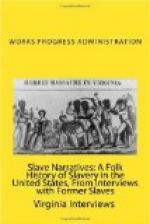Berry Smith, Ex-slave, Scott County
FEC
W.B. Allison
Rewrite, Pauline Loveless
Edited, Clara E. Stokes
BERRY SMITH
Forest, Mississippi
“Uncle Berry” Smith is five feet two or three inches tall. He is scrupulously neat. He is very independent for his age, which is calculated at one hundred and sixteen years. He believes the figure to be correct. His mind is amazingly clear.
“I was born an’ bred in Sumpter County, Alabama, in de prairie lan’, six miles from Gainesville. Dat’s where I hauled cotton. It was close to Livingston, Alabama, where we lived.
“I was twelve years old when de stars fell. Dey fell late in de night an’ dey lighted up de whole earth. All de chaps was a-runnin’ ‘roun’ grabbin’ for ’em, but none of us ever kotched[FN: caught] one. It’s a wonder some of’ em didn’ hit us, but dey didn’. Dey never hit de groun’ atall.
“When dey runned de Injuns out de country, me an’ another chap kotched one o’ dem Injun’s ponies an hung him up[FN: tied him up] in de grape vines. He said it was his pony an’ I said it was mine.
“Marse Bob’s boy tol’ us his daddy was gwine a-whup us for stealin’ dat pony, so we hid out in de cane for two nights. Marse Bob an’ his brother whupped us’ til we didn’ want to see no more Injuns or dey ponies, neither.
“I was born a slave to Old Marse Jim Harper an’ I fell to Marse Bob. Marse Jim bought my pa an’ ma from a man by de name o’ Smith, an’ Pa kep’ de name. Dat’s how come I is Berry Smith.
“Dey didn’ have no schools for us an’ didn’ teach us nothin’ but work. De bull-whip an’ de paddle was all de teachin’ we got. De white preachers used to preach to de Niggers sometimes in de white folks’ church, but I didn’ go much.
“We had fun in dem days in spite o’ ever’thing. De pranks we used to play on dem paterollers! Sometimes we tied ropes ‘crost de bridge an’ de paterollers’d hit it an’ go in de creek. Maybe we’d be fiddlin’ an’ dancin’ on de bridge (dat was de grown folks, but de chaps ’ud come, too) an’ dey’d say, ‘Here come de paterollers!’ Den we’d put out. If we could git to de marster’s house, we was all right. Marse Bob wouldn’ let no pateroller come on his place. Marse Alf wouldn’, neither. Dey said it was all right if we could git home widout bein’ kotched, but we have to take dat chance.
“At de Big House dey had spinnin’ wheels an’ a loom. Dey made all de clo’es[FN: clothes] on de place. Homespun was what dey called de goods. My ma used to spin an’ weave in de loom room at de Big House.
“Dey was two plantations in de marster’s lan’ an’ dey worked a heap o’ Niggers. I was a house boy an’ didn’ go to de fiel’ much.
“We had overseers on de place, but dey was jus’ hired men. Dey was po’ white folks an’ only got paid ‘bout three or fo’ hund’ed dollars a year.
“When we lef’ Alabama we come to Mississippi. We went to de Denham place near Garlandsville. We brought eighteen Niggers. We walked a hund’ed miles an’ it took five days an’ nights. De women an’ little chaps rid[FN: rode] on de wagons (dey had five mules to de wagon) an’ de men an’ de big chaps walked. My pa an’ ma come along.




